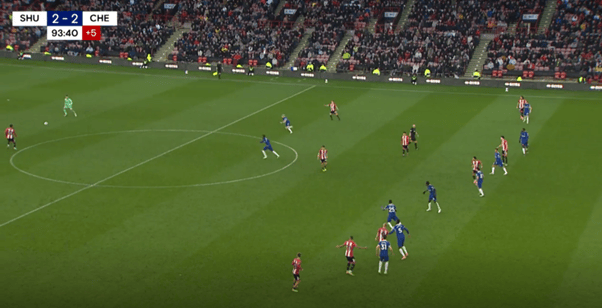- London is Blue Dispatch
- Posts
- London is Blue Dispatch #040
London is Blue Dispatch #040
Chelsea's Defensive Woes: Who and What Is To Blame?
Only 200 odd seconds remained to navigate against the Premier League’s whipping boys, and yet the acrid stench of an equalizer stung the nostrils minutes before it arrived. Chelsea lined up in a highly effective 8-0-2 to defend against a long ball from a side that had scored 28 in 30 PL games. Chelsea had four CBs on the field to defend against that very situation, and yet three of them erred to gift McBurnie a chance worth 0.60 xG – a little less than half of Sheffield United’s entire tally across the 90. The image below sums up everything wrong with the defence – a backline resembling a curved spine under the debilitating effects of scoliosis, the pressure of a growth spurt forcing each vertebra to bear no alignment whatsoever to the next.

The lack of a backbone has been evident throughout a tumultuous season. Sheffield United’s equalizer was the 17th conceded by the Blues after the 76th minute mark, their worst tally this millennium. Even in Lampard’s 19/20 season with a transfer ban and Fikayo Tomori and Reece James stepping up from the academy, Chelsea conceded 15. In the infamous 10th place finish under Mourinho, 14 were shipped. There are at least nine games left in the season.
While players rightly get lambasted for a lack of focus and maturity to see out games, Pochettino’s failure to manage end game situations seem firmly at the heart of the issue. After a hattrick by Cole Palmer from the right wing, Poch bizarrely chose to move him centrally, away from his favoured role, in all probability to reward Madueke for his impact against United. It was also apparent by the end of the first half that multiple players were fatigued after the physical and emotional exertions of a rollercoaster 4-3 win vs United, yet Poch made four changes, two of them in the 93rd minute, seconds before the goal. Poch’s 115 subs this season place him 16th in the PL – it is also interesting to note that Pep Guardiola is 19th with just 88. There could be some stock in the theory that City’s controlled, possession-intensive style requires less fatigue-related changes, while our adrenaline-junkie-on-a-weekend-bender style requires more proactive management.
For example, two sides with less subs than us in the PL table, West Ham and Crystal Palace, who prefer conceding the ball (in the bottom 5 for avg possession) and hitting teams on the break, have conceded 21 and 15 respectively. While Poch’s attacking changes have led to 4 stoppage time winners compared to 0 last season, his defensive changes have had the exact opposite effect.
Trevoh Chalobah #SHUCHE
— CFC Pics (@Mohxmmad)
4:55 PM • Apr 7, 2024
Where do we go from here?
Here’s a crazy stat – last season, in Europe’s top 5 leagues, Chelsea sat 46th on xG (52.5) out of 98 teams, and 48th on expected goal-difference (xGD) with -3. This season, Chelsea are 10th on xG, above PSG, above Real Madrid. On xGD, we now sit 19th on +12.3; the difference being that our actual goal difference is +3, thanks to 52 goals conceded from 44.7 xG. The difference between last season to this, in attack, is startling. The defence however could desperately do with stability and support, two things that are hard to find in a system the prioritizes the relentless pursuit of attacking transitions.
In Klopp’s first season at Liverpool in 15/16, gung-ho heavy-metal football with defensive naiveté led to an 8th place finish with 63 goals scored and 50 conceded. Next season, they scored 78, but still conceded 42, finishing 4th. The season after that, they conceded 38, only to finish 4th again. It wasn’t until the 18/19 season, the first one in which Van Dijk and Alisson started every game, that Liverpool conceded only 22 and won the league. Attacks win you games, defences win you titles, after all. Spending £140m on two transformative signings is now inconceivable in every way (Profit and Sustainability Rules, three lavish transfer windows, club’s youth-first strategy etc), which leaves us to do things the hard way.
Does a better structure and a more measured approach in possession stem the flow of goals, fix exhaustion issues in the final 15 minute of games, and perhaps, lead to fewer injuries? Certainly. Does that very same structure also significantly dull an attack that thrives in transition and space and has failed multiple times against low blocks? Also yes. For our fortunes to change, our approach in seeing out games in the last 15 minutes of games must change, from manager down to the players. After all, it is well and good if we have the firepower to take the lead, but what is the point if we cannot keep it?